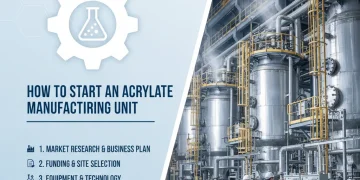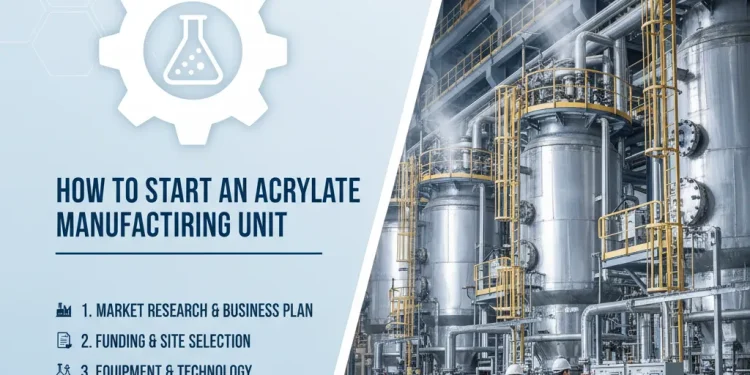Acrylate Manufacturing Unit: The global market for special chemicals is growing. Acrylic demand is particularly strong because they are needed for special colors, adhesives, plastics, textiles and personal care products such as disposable diapers. At present, India is dependent on the import of acrylic, indicating the potential for domestic production.
Local production will facilitate needs on the local market and for entrepreneurs focused on other markets. These new businesses will improve self -confidence and help government objectives of reducing dependence on importance and at the same time provide access to one of the fastest expanding industries of the Indian economy (acrylic manufacturing unit).
Read More: How to Start a Profitable Acrylic Sheet Manufacturing Unit
Acrylate Manufacturing Unit: On the basis of demand to proceed with the opportunity
Building sector
The construction industry will continue to increase acrylic consumption. Indian urbanization is fast and many new roads, buildings and other building infrastructure are built to keep up. Such development places higher demand for acrylic colors, sealants and cannons. The development of infrastructure will increasingly depend on universal acrylic.
Retail and packaging
Since people nowadays still have hygiene, the use of packaged foods and electronic trading supplies tends to rise and the need for packaging materials is increasing appropriately. As acrylates perform adhesives and barrier coatings for packaging materials, the use of acrylic use can be expected to expand the retail and electronic industries.
Textile
In the Indian textile and clothing industry, acrylates were used to complete the textile. The acrylates were appreciated when increasing stronger, better textures and improving the performance of the fabric. It was awarded on the domestic market and on the export market.
Hygiene
Hygiene products, such as diapers and sanitary inserts, use acrylic acid, a precursor for the production of superabsorbent polymers. This part of the industry is growing rapidly with increasing demand due to an increase in available income and lifestyle.
In India, the value chains are dominated by the imports of imports. As a result, the market for products is over more than suitable for new participants to establish themselves as reliable local suppliers.
Read Our Book: Click Here
Acrylate Manufacturing Unit: Conventional acrylates that can be made
Butyl -acrylate – required to formulate colors, coatings and adhesives. It is essential for the construction and automotive industry.
2 -ethylhexylakrylate – this is made for use in textiles, adhesives and flexible packaging.
Acrylic acid – this is produced for use in cleaning agents, cleaning agents and hygiene products and as a precursor for Superabsorbent Polymer.
Acrylonitril – used as an engineering plastic in the automotive and electronic industries.

Acrylate Manufacturing Unit: Step by step the production process for acrylates
Stage 1: Preparation and feeding of raw materials
Production begins with the preparation of the required raw material. For example, for Butylykrylate acrylic and n-butanol acid are combined and sent to the pre-storage chamber from storage tanks. N-butanol is used in a slight surplus to ensure complete reaction.
Then the reaction is accelerated by the use of a chemical catalyst, usually sulfuric acid or some special resins.
Stage 2: The main reaction inside the reactor
The reaction is performed by a closed stainless steel reactor. It is equipped with heating systems and mixing. Pre -mixed materials and catalyst are placed in the reactor and mixing is performed continuously to mix the materials uniformly. The temperature is maintained between 80 and 120 degrees.
The reactor is the place where the process is carried out. Heating and mixing provide the necessary atmosphere, while the catalyst plays the role of the host. The catalyst facilitates the formation of butylykhylate from acrylic and n-butanol acid.
Click Here: Adhesive Products Business Startup: Key Insights and Advice
Read Our Project Report: Click Here
Stage 3: Removing a by -product
It means removing the by -product to ensure that the reaction takes place appropriately. The water and excess butane steam, which escapes the reactor, is subject to the cooling and condensation process. They are then cooled and condensed for liquefaction and collect.
Separate devices fulfill the intended role of condensate collection. The separator uses the unimaginability of butane and water to allow the creation of different layers. The water layer, which is naturally exhausted, is returned to the system, while butane is reclaimed and recycled back to the reactor.
Stage 4: Neutralization and Cleaning
The raw reaction material is transported to the neutralization tank. And after neutralized it is neutralized, excess acid is removed by adding alkaline solution of sodium carbonate and catalyst.
Distillation technique allows us to insulate the components of the mixture based on differences in boiling points. Butyl acrylic, along with heavier fractions, is collected in the middle, lower and condensed parts of the distillation column.
The system is recovering and recycling most lighter fractions, while condensed heavier fractions are collected and stored at the bottom of the column. Lighter fractions that are collected and stored in the upper part of the column are released into the atmosphere and are reconciled to the lighter fractions in the column during the stay.
Step 5. Stabilization, storage and packaging
Acrylic products can be stabilized by the introduction of a small amount of controllable polymerization to prevent the formation of solid plastic structures by self -polo -oil.
The acclimation of the final product in sealing containers is carried out after the product is evaluated to determine quality, cleanliness and efficiency. Each individual container used to insulate the product is traced back to the quality checkpoint during distribution to the end users (acrylic manufacturing unit).
Note: The whole process must also adhere to the described environment, together with the inspection of the waste integral process, to minimize the risks associated with the emission and chemicals in the process (acrylic manufacturing unit).
Find the Best Idea for Yourself With our Startup Selector Tool
Acrylic manufacturing unit: How can we help you start your business
Are you excited to start a business, but confused from the initial steps? No worries because Niir Project Consultancy Services (NPCS) offers comprehensive business settings at every step. We will prepare a detailed message (DPR) that will facilitate your plan that covers all critical points.
This report outlines step by step of the production process, necessary machines, the total project costs and expected profit margins. With all this information, you will be able to transform your business idea into a functional production plant (acrylic unit).
Acrylic manufacturing unit: Frequently asked questions (FAQ)
What is the meaning of “acrylic” for an acrylic production unit?
These are compounds that increase different products. For example, they improve color durability, increase adhesive adhesion and increase diaper absorption.
Why are they currently a good business idea for acrylic production in India?
India is one of the fastest growing economies in the world that is good for the acrylate production unit. With growing sectors of construction and packaging, there will be demand for acrylic products. Instead of importing imports, India could become self -sufficient and profitable (Acrylate Manufacturing Unit).
Are chemical companies (acrylic manufacturing unit) expensive?
Of course. Chemical businesses and plants include large operating costs, but also provide large profit margins.
What are your finished products specifically refer to?
Acrylic manufacturing units involved in construction and packaging buy these chemicals. Such businesses use acrylic products in colors, adhesives and cannons (Acrylate Manufacturing Unit).
Do I have to be a chemical specialist to start the activities of acrylic unit?
You do not have to have technical background for acrylic units if you have a desire to start your business. Once you are investing, you can hire technical and chemical experts on the operation of the plant. A service like NPCS can offer you project planning and the appropriate information necessary for you (Acrylate Manufacturing Unit).


















